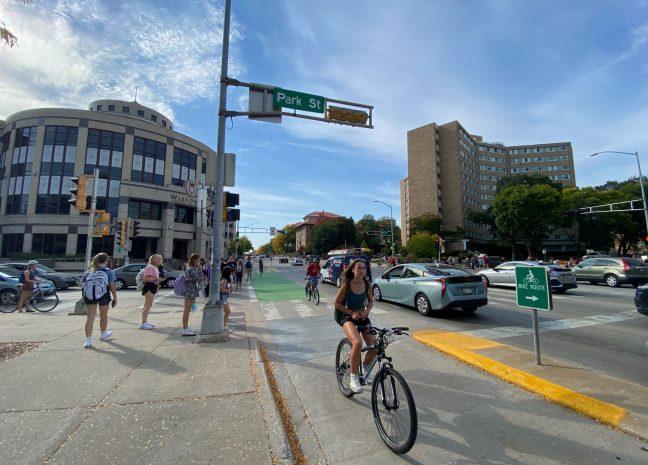As electric vehicle policies and practices gain traction in the Midwest, Wisconsin experts point to adopting electric vehicles as a key strategy to combat carbon emissions.
At the beginning of October, five governors of Illinois, Indiana, Michigan, Minnesota and Wisconsin banded together in an effort to create a network of charging stations for electric vehicles across the Midwest. The initiative, called REV Midwest, hopes to make owning an electric vehicle easier by expanding charging accessibility.
The plan comes as Midwest states have taken to electric vehicles slower than other states, despite the fact that transportation accounts for nearly 25% of energy consumption in Wisconsin and 29% of greenhouse gas emissions in the United States.
Chris McCahill, managing director at the State Smart Transportation Initiative, views fighting the battle with carbon emissions from a transportation perspective as a three-legged stool: the source of energy, vehicle efficiency and total driving time. McCahill said shifting the transportation sector toward a cleaner, more efficient state will help address each of these legs.
“What we’ve seen over the last decade or so is that even as cars are getting more efficient, emissions are still going up in the transportation sector,” McCahill said. “It’s now the largest sector for emissions, and that’s because the average person is driving more and more each year.”
McCahill said electric vehicles are a key part of the equation of reducing carbon emissions because they improve vehicle efficiency and become more accessible as technology improves.
Wisconsin is slightly behind in the adoption of electric vehicles, with 8,259 sold to date. In 2019, electric vehicle market share was only 0.81%, which is well behind the total U.S. market share of 2.11%.
In Madison, however, the electric vehicle trajectory is promising. Mahanth Joishy, superintendent of the City of Madison Fleet Service, has made it his goal to battle greenhouse gas emissions by promoting sustainability in the fleet. The Fleet Service is in charge of purchasing and maintaining city agencies’ and departments’ equipment, which includes city-owned vehicles.
“I can promise that, all the millions of dollars in my budget, I will put all of it into sustainability,” Joishy said. “And we already are starting to do that.”
Since Joishy joined the Fleet Service in 2017, he said the fleet went from zero to 60 electric vehicles with more on the way. They use over 100 hybrid vehicles, the first and only electric fire truck in North America, anti-idling technology in ambulances for medical work with the engine off, soybean based tires and biodiesel, which is their biggest sustainability program.
Implementing these sustainable practices contributes to clean energy goals in Wisconsin as well as the local economy. Joishy said charging electric vehicles costs about one third the price of the cheapest gasoline options. The biodiesel in their trucks comes from Wisconsin soybean oil and is refined at a Dane County facility.
“There’s no reason why Wisconsin can’t be the cleanest, the greenest in the world and also make the most money from it,” Joishy said. “There’s a lot of profit to be made in better batteries. Better charging stations and better fuels. And, if we do it well here, they will want to buy this everywhere else.”
Though to promote electric vehicles, the technology needs to be easy to use and accessible, McCahill said. This means states should be working to help introduce more charging stations into communities and make the charging faster, he explained.
As the Midwest attempts tackle this goal with REV Midwest, the Biden-Harris administration has proposed a $7.5 billion investment in providing electric vehicle charging infrastructure to communities that need it.
“Just as equally big a part is we need charging infrastructure,” Joishy said. “We need the cities, the utilities, the universities like UW and the whole system to invest in electrical capacity and charging stations to power up all of these vehicles.”
One hurdle in promoting electric vehicle adoption is mechanical issues, Joishy said. For example, the fleet has 35 Chevrolet Bolts, an all electric car, which currently has a safety recall to avoid battery fires. While some batteries have resulted in high profile fires, gasoline and diesel engines are much less safe and can easily explode as well.
The outlook for Wisconsin is positive, but will require time, work and investment from members of the community. Joishy said fighting climate change is a war, and everyone needs to pick a side and contribute.
He encouraged people to consider buying an electric vehicle, taking the bus, biking or even finding a job in the promising field of sustainability to fight this battle for future generations.
“If anyone wants to be a part of this revolution, it’s an exciting time, and we’re only at the beginning of it,” Joishy said. “The 2020’s in the realm of transportation will see more change than the last 100 years combined.”


